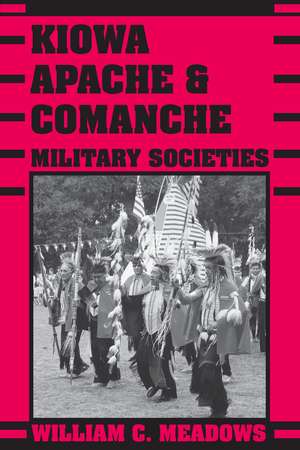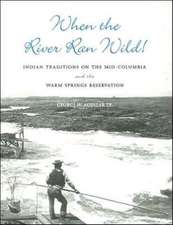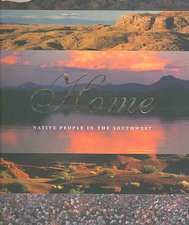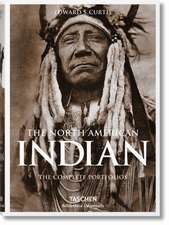Kiowa, Apache, and Comanche Military Societies: Enduring Veterans, 1800 to the Present
Autor William C. Meadowsen Limba Engleză Paperback – sep 2002
For many Plains Indians, being a warrior and veteran has long been the traditional pathway to male honor and status. Men and boys formed military societies to celebrate victories in war, to perform community service, and to prepare young men for their role as warriors and hunters. By preserving cultural forms contained in song, dance, ritual, language, kinship, economics, naming, and other semireligious ceremonies, these societies have played an important role in maintaining Plains Indian culture from the pre-reservation era until today.
In this book, Williams C. Meadows presents an in-depth ethnohistorical survey of Kiowa, Apache, and Comanche military societies, drawn from extensive interviews with tribal elders and military society members, unpublished archival sources, and linguistic data. He examines their structure, functions, rituals, and martial symbols, showing how they fit within larger tribal organizations. And he explores how military societies, like powwows, have become a distinct public format for cultural and ethnic continuity.
Preț: 393.45 lei
Nou
Puncte Express: 590
Preț estimativ în valută:
75.28€ • 78.60$ • 62.31£
75.28€ • 78.60$ • 62.31£
Carte tipărită la comandă
Livrare economică 04-18 aprilie
Preluare comenzi: 021 569.72.76
Specificații
ISBN-13: 9780292705180
ISBN-10: 0292705182
Pagini: 527
Ilustrații: 16 halftones, 6 tables
Dimensiuni: 152 x 229 x 33 mm
Greutate: 0.45 kg
Editura: University of Texas Press
Colecția University of Texas Press
ISBN-10: 0292705182
Pagini: 527
Ilustrații: 16 halftones, 6 tables
Dimensiuni: 152 x 229 x 33 mm
Greutate: 0.45 kg
Editura: University of Texas Press
Colecția University of Texas Press
Notă biografică
William C. Meadows is Professor of Anthropology and Native American Studies at Missouri State University.
Cuprins
- List of Illustrations
- List of Tables
- Preface
- Acknowledgements
- Pronunciation Guide: The Parker McKenzie Kiowa Language Orthography
- 1. Sodalities and Plains Indian Military Societies
- 2. Yàpfàhêgàu: Kiowa Military Societies to 1875
- 3. The Decline and Revival of Kiowa Military Societies, 1875 to the Present
- 4. Plains Apache Naishan Military Societies
- 5. Comanche Military Societies
- 6. Comparison and Conclusions
- Notes
- Bibliography
- Index
Recenzii
Meadows combines extensive ethnographic fieldwork, archival research, and analysis of symbols to reconstruct the history and significance of the military societies of the Kiowa, Apache, and Comanche tribes of southwestern Oklahoma. More important, he shows how these groups adapted in the twentieth century to provide each tribe with its own distinctive identity while serving as tools for social integration and enculturation at the same time.
Meadows produced a book that captures and records for all time the specifics of military society ceremonies, history and organization. In documenting and preserving these aspects of Indian life, he created a work valuable not just to anthropologists but to native preservationists as well.
Because of the book’s descriptive content, readers interested in the clothing, songs, dances, recruitment strategies, and symbols used by the various military societies recognized by the Comanches, Apaches, and Kiowas will find this work incredibly useful.
This book deserves praise, especially for the author’s own fieldwork and thorough use of the Native voice in depicting the multifaceted roles these sodalities played in Southern Plains Indian cultures.
This is a good book, detailed, scholarly, and clearly presented. . . . The importance of [the author’s] fieldwork cannot be overemphasized. The research is solid. The author used important, and some long-forgotten, archival manuscripts and the best linguistic data available.
Descriere
An in-depth ethnohistorical survey of Kiowa, Apache, and Comanche military societies, drawn from extensive interviews with tribal elders and military society members, unpublished archival sources, and linguistic data.











